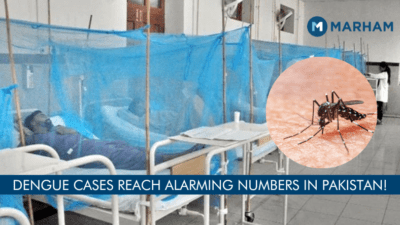Many Pakistanis are not only facing a super flood but are also suffering from the deadly dengue virus. The dengue cases have been rising since August all over the country.
31 dengue cases have been reported in Rawalpindi, 37 cases in Lahore, ten in Gujranwala, and six in Multan, as of today. In Islamabad, as many as 53 dengue cases were recorded in the previous 24 hours, bringing the total number of verified dengue cases to 373 on Sept 7th, 2022.
According to the health department of Punjab, a total of 1,719 dengue cases have been documented in 2022 so far. Four people have died from the illness and 431 patients are being treated in various hospitals around the province of Punjab.
Read Also: Signs and Symptoms of Dengue Fever: Causes, Treatment & Prevention
Preventative measures are also being taken by the government, especially in Punjab. During the continuous daily monitoring, an anti-dengue squad from the Punjab Primary and Secondary Healthcare Department (P&SHD) eliminated dengue larvae in 2,673 locations across the state.
People who are violating dengue SOPs are being fined and are even getting arrested. During the previous three days in Punjab, authorities have arrested 68 people and recorded 639 cases for violating dengue SOPs in various towns.
Read Also: 8 Best Fruits for Dengue Patients
If we talk about Sindh, in the first five days of September, the health department registered 347 instances, with the majority of the cases reported in Karachi East. In August, a total of 1,265 dengue cases were reported.
Hundreds of patients with complaints of headache, high fever, diarrhea, and joint, and muscle pain, all of which are signs of malaria and dengue are being reported in Sindh. The dengue and malaria wards at hospitals, which had been empty for several months, are now fully packed.
Read Also: How Dengue Spreads – Pakistan Under Attack Again!
According to a senior doctor from the Sindh Infectious Disease Hospital and Research Centre:
“A major problem we are experiencing is lack of space. All our high dependency units on three flours are 95 percent full.”
Dr. Saeed Khan, a professor from the Sindh Public Health Lab at the university gave the following information in an interview with the Dawn News:
“By mid-August, we have had 20pc dengue cases out of the 1,300 samples received from our labs across the city. Later, out of the 1,563 suspected samples, 30pc were detected to be dengue. By the end of August, we had received 3,274 samples out of which 40pc of samples were confirmed dengue cases.”
Waterborne and mosquito-borne illnesses have spread in Sindh, which has been ravaged by heavy rains and flooding. The rapid rise in demand has resulted in a mosquito net shortage in the city.
Doctors recommend the usage of mosquito nets and repellents. It is also important to seek medical attention as soon as you notice signs of dengue or malaria.
Dr. Waris Jakharani of Dr. Ruth KM Pfau Civil Hospital Karachi advises avoiding home remedies and instead only using medications prescribed by a doctor. Click here to see an Online Doctor for Dengue Treatment today via the Marham app.

